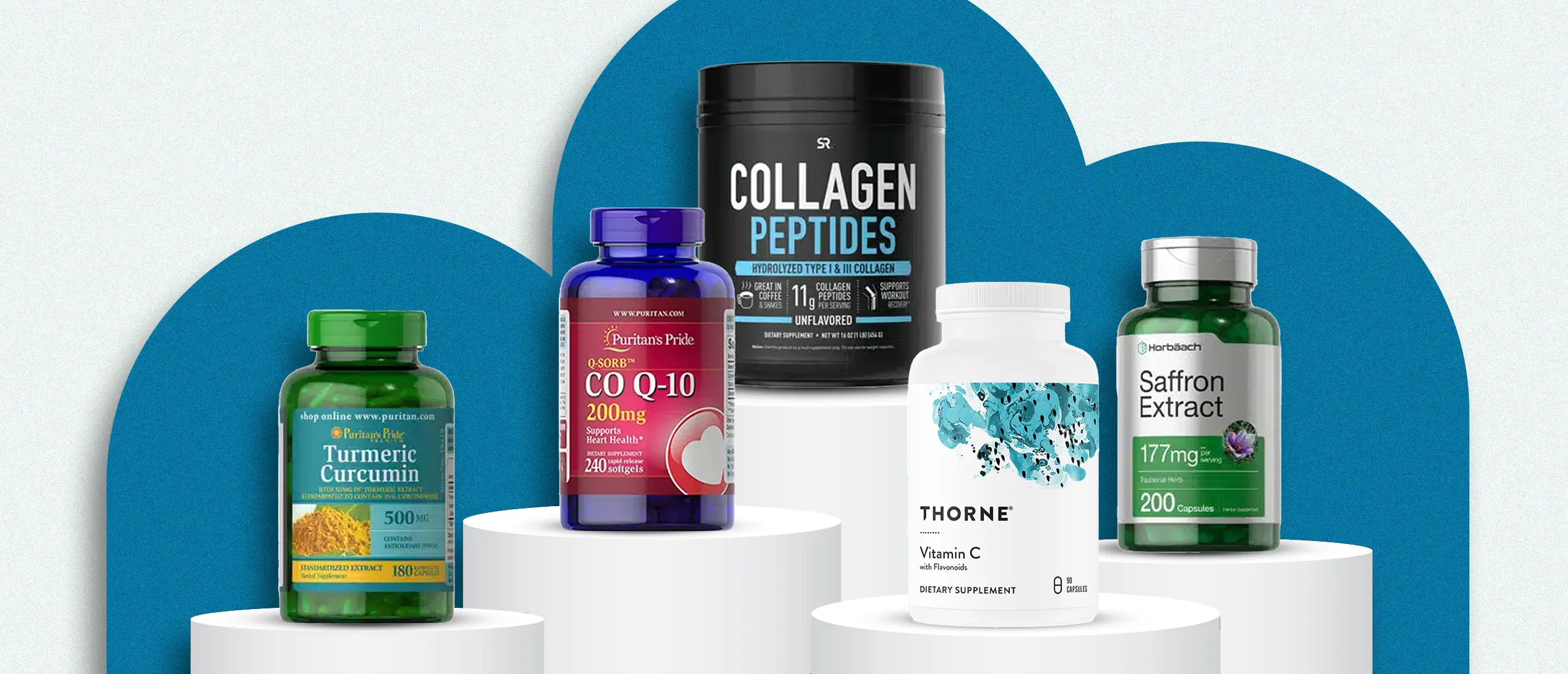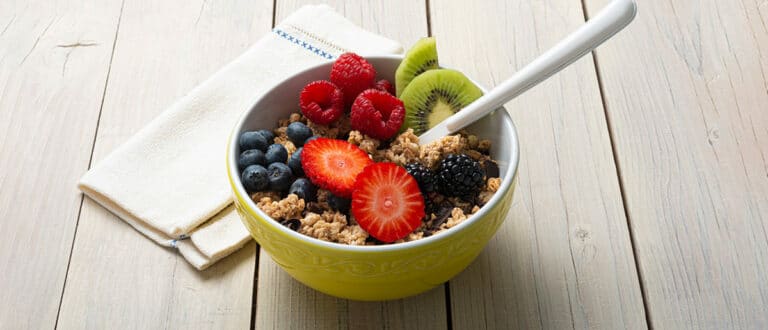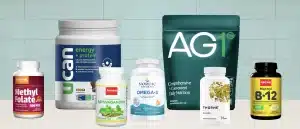The 12 Best Anti-Aging Supplements of 2024
It’s a fact of life that our bodies age and decline as we get older. But a new wave of science is showing that some vitamins and compounds may extend your healthspan by helping to slow down the aging process and ward off age-related diseases on a cellular level.
Here’s the thing: Aging doesn’t just lead to gray hair and wrinkles. With every birthday, your cells also age. And the older your cells get, the more they’re at risk for becoming damaged. Your telomeres (protective caps at the ends of your chromosomes) shorten. You accumulate zombie cells which increase the chronic inflammation tied to age-related diseases like Alzheimer’s, heart disease, and cancer.
Certain anti-aging vitamins help combat inflammation and cellular aging to keep you as biologically young as possible. Here are 12 to add to your stack.
The Best Anti-Aging Supplements
1. Collagen
Collagen serves as the main structural protein in your skin, bones, and tendons (1). It’s also key in maintaining the skin’s firmness and elasticity (2). But collagen production begins to naturally decline in the body in early adulthood, slowing down by about 1 to 1.5% every year.
Studies on collagen supplements are promising. One study in Nutrients found that a drinkable supplement of collagen peptides blended with vitamin C, vitamin E, zinc, biotin, and fruit extract improved skin hydration, elasticity, and density in participants—and the effects remained a month later, even after stopping the product (3).
Researchers suspect that, unlike topical skin care products, the bioactive short chain nutritional collagen peptides can reach deeper layers of your skin.
2. Vitamin A
Vitamin A supports healthy immune function, cell-to-cell communication, and cellular growth and development. It helps your organs, including the heart and lungs, function well. It’s great for your eyes, too: People low in Vitamin A may develop vision problems, including night blindness (4). Taking a vitamin A supplement may help reduce the risk of certain cancers and age-related vision loss.
Aim for 900 mcg RAE (the unit for Vitamin A), with the following breakdowns:
- 1 IU retinol = 0.3 mcg RAE
- 1 IU supplemental beta-carotene = 0.3 mcg RAE
- 1 IU dietary beta-carotene = 0.05 mcg RAE
- 1 IU dietary alpha-carotene or beta-cryptoxanthin = 0.025 mcg RAE
3. Vitamin D
The sunshine vitamin reduces inflammation and helps with cellular growth, neuromuscular and immune function, and glucose metabolism. It may also help preserve muscle and bone health and function (5). Vitamin D has been linked to higher testosterone levels (T levels decline with age and can lead to a litany of symptoms that make you look and feel older).
Your body produces vitamin D when sunlight hits the skin, but you may not get enough through this process. And it can be tough to get enough from food, so supplements may be a safer bet.
Aim for the recommended daily dose for men, 600 IUs a day.
4. Curcumin
The principal component of turmeric, curcumin has long been known in traditional medicine for its anti-inflammatory properties. Your body isn’t great at absorbing it from food sources which may be why many experts recommend supplements (6).
Some researchers suspect that curcumin may help reduce inflammation at a cellular level, which may boost memory and help reduce symptoms of some age-related diseases including cancer, atherosclerosis, and diabetes.
In one review of studies, turmeric supplements also helped improve joint function and reduce the pain associated with osteoarthritis (7).
5. Resveratol
Resveratrol is a polyphenol found in grapes, blueberries, and peanuts that may reduce oxidative stress and age-related inflammation. It might also improve mitochondrial function, which plays a role in many processes associated with diseases, including cancer (8).
Some studies suggest resveratrol supplements may help reduce the risk of age-related conditions including diabetes, cancer, and certain neurodegenerative conditions like Alzheimer’s disease (9, 10).
6. Zinc
A study published in 2021 in mice found that supplementation with zinc—a crucial nutrient for proper immune system functioning—may help prevent inflammation and immune system dysfunction that can occur with aging (11).
Zinc plays important biological roles in the body, including a part in cell division and proliferation. Zinc also participates in antioxidant activity. But zinc concentration in the brain actually decreases as you age, so supplementing may potentially help preserve cognitive functioning, memory, and other neuro processes, as well as reduce oxidative stress that can damage neurons.
7. Nicotinamide Riboside (NR)
Nicotinamide riboside (NR) is a form of vitamin B found in fruits, vegetables, meat, and milk. It’s a precursor to NAD+, a compound that Hone Health Chief Medical Officer Jack Jeng, M.D., has called “one of the most promising and exciting molecules in the field of aging and longevity.”
NAD+ is found in every cell of your body. It plays a crucial role in major biological processes including cell survival, metabolism, immune system activity, and DNA repair.
Your body’s ability to create NAD+ using precursors like NR and NMN declines with age, which may be associated with the onset of age-related diseases like Alzheimer’s (12). You can boost NAD+ levels directly via injections, oral supplements, or IV therapy, but some research in animals suggests that supplementing with NR also helps restore NAD+ levels (13).
Read more about Tru Niagen here.
8. CoQ-10
According to Mount Sinai in New York, some researchers believe that CoQ10 might help with heart-related conditions because it may reduce or even help prevent blood clots and has antioxidant properties (14).
CoQ10 has also been studied for age-related neurological diseases, such as Parkinson’s without conclusive evidence. But a study in Frontiers notes that a deficiency of CoQ10 has been found in tissues and organs in cases of chronic diseases which has led to the hypothesis that supplementing could help alleviate aging symptoms and/or slow the onset of these diseases (15).
9. Crocin
Crocin is a carotenoid (it’s primarily what gives saffron its color). Research suggests that carotenoids may be associated with warding off cognitive decline from aging, serving as an anti-inflammatory, and even having some anti-cancer effects (16). Crocin may help with skin aging. In one study, Crocin was found to help protect against damage caused by UVA radiation (17).
In another study, supplementing with crocin improved insulin resistance and control of blood sugar levels in people with type 2 diabetes. (18). Stabilizing blood sugars can be an important part of preserving cellular and metabolic health through aging.
10. Fish Oil
Evidence continues to accumulate on the health benefits of fish oil as you age: It may help lower blood pressure, heart rate, and triglycerides, blood pressure, and heart rate, while improving HDL (the “good” cholesterol) and immune system function.
Some research suggests that fish oil may help with mental health, such as potentially helping to decrease depression and elevate positive moods. (19).
Results from a clinical trial published in Brain, Behavior, and Immunity, found that fish oil may improve aging markers such as telomere shortening (telomeres are strands of DNA capping the ends of chromosomes. They protect chromosomes from damage and shorten each time your cells divide; when the telomere becomes too short, the chromosome can no longer divide) and may help lower inflammation.
11. Vitamin K
Age is the most important known risk factor for Alzheimer’s disease, according to the National Institute on Aging. People who carry a gene called the ApoE4 allele are at risk (that’s the one Chris Hemsworth recently discovered that he has).
An article published in 2021 in Nutrients proposed that nutritional protocols targeting metabolic pathways altered by ApoE4 may help prevent the disease. The authors point out that vitamins D and K may help people predisposed to Alzheimer’s because they may help reduce inflammation, as well as target pathways to potentially have a protective effect on bone and heart health.
Like Vitamin D, Vitamin K in the form the body can use, may be hard to get from your food choices, which is why supplementation may be especially helpful (20).
12. Vitamin C
While we’re talking about vitamins, let’s close with a little Vitamin C. A study published in 2019 found that Vitamin C concentration from diet or supplementation was associated with better cognitive performance on things such as working memory, recognition, decision speed, recall, and attention (21).
Importantly, the study also found that Vitamin C from food and supplements both offer the same beneficial impact, which points to the potential importance of a quality supplement if you’re hoping to improve cognitive performance but consume a low-C diet.
Vitamin C is also essential to collagen production and, as an antioxidant, offers some protection against skin damage from exposure to UV radiation, which may also help improve the appearance of hydration and wrinkles (22, 23).
Always check with your own healthcare provider before adding any new and regular supplements.
References
1. Wang H (2021): A review of the effects of collagen treatment in clinical studies.
2. Reilly DM, Lozano J. (2021): Skin collagen through the lifestages: Importance for skin health and beauty.
3.Bolke L, Schlippe G, Gerß J, Voss W. A (2019): Collagen supplement improves skin hydration, elasticity, roughness, and density: Results of a randomized, placebo-controlled, blind study.
4. The National Institute of Health (2022): Vitamin A and Carotenoids.
5. The National Institute of Health (2022): Vitamin D.
6. Bielak-Zmijewska A, Grabowska W, Ciolko A, Bojko A, Mosieniak G, Bijoch Ł, Sikora E (2019): The role of curcumin in the modulation of ageing.
7. Paultre K, Cade W, Hernandez D, Reynolds J, Greif D, Best TM. (2021): Therapeutic effects of turmeric or curcumin extract on pain and function for individuals with knee osteoarthritis: a systematic review.
8. Klein Katherine, et al. (2020): Role of Mitochondria in Cancer Immune Evasion and Potential Therapeutic Approaches.
9. Zhou DD, Luo M, Huang SY, Saimaiti A, Shang A, Gan RY, Li HB. (2021): Effects and mechanisms of resveratrol on aging and age-related diseases.
10. Norwitz NG, Saif N, Ariza IE, Isaacson RS (2021): Precision nutrition for Alzheimer’s prevention in ApoE4 carriers.
11. Wong CP, Magnusson KR, Sharpton TJ, Ho E (2021): Effects of zinc status on age-related T cell dysfunction and chronic inflammation.
12. Yaku, K., Okabe, K., Gulshan, M. et al. (2019). Metabolism and biochemical properties of nicotinamide adenine dinucleotide (NAD) analogs, nicotinamide guanine dinucleotide (NGD) and nicotinamide hypoxanthine dinucleotide (NHD)
13. Mills KF, et al. (2016). Long-Term Administration of Nicotinamide Mononucleotide Mitigates Age-Associated Physiological Decline in Mice.
14. Mount Sinai (2023): Coenzyme Q10.
15. Hernández-Camacho JD, et al (2018). Coenzyme Q10 Supplementation in Aging and Disease.
16. Science Direct (various dates): Crocin.
17. Fagot D, Pham DM, Laboureau J, Planel E, Guerin L, Nègre C, Donovan M, Bernard BA (2018): Crocin, a natural molecule with potentially beneficial effects against skin ageing.
18. Behrouz V, Dastkhosh A, Hedayati M, Sedaghat M, Sharafkhah M, Sohrab G. (2020): The effect of crocin supplementation on glycemic control, insulin resistance and active AMPK levels in patients with type 2 diabetes: a pilot study.
19. Kiecolt-Glaser J (2012): Fish Oil (Omega 3), Immune Function, and Mood.
20. Norwitz NG, Saif N, Ariza IE, Isaacson RS. (2021). Precision Nutrition for Alzheimer’s Prevention in ApoE4 Carriers.
21. Travica N, Ried K, Sali A, Hudson I, Scholey A, Pipingas A. (2019). Plasma Vitamin C Concentrations and Cognitive Function: A Cross-Sectional Study.
22. De la Fuente M, Sánchez C, Vallejo C, Díaz-Del Cerro E, Arnalich F, Hernanz Á. (2020): Vitamin C and vitamin C plus E improve the immune function in the elderly.
23. Michalak M, Pierzak M, Kręcisz B, Suliga E. (2021): Bioactive compounds for skin health: A review.














